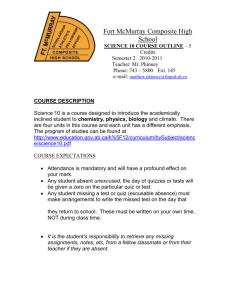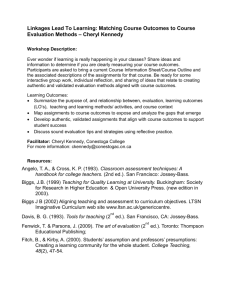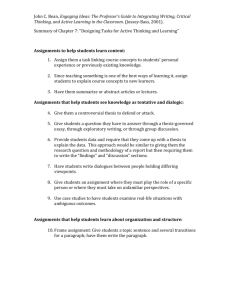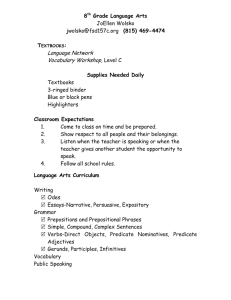Getting Students to Prepare for Class draft
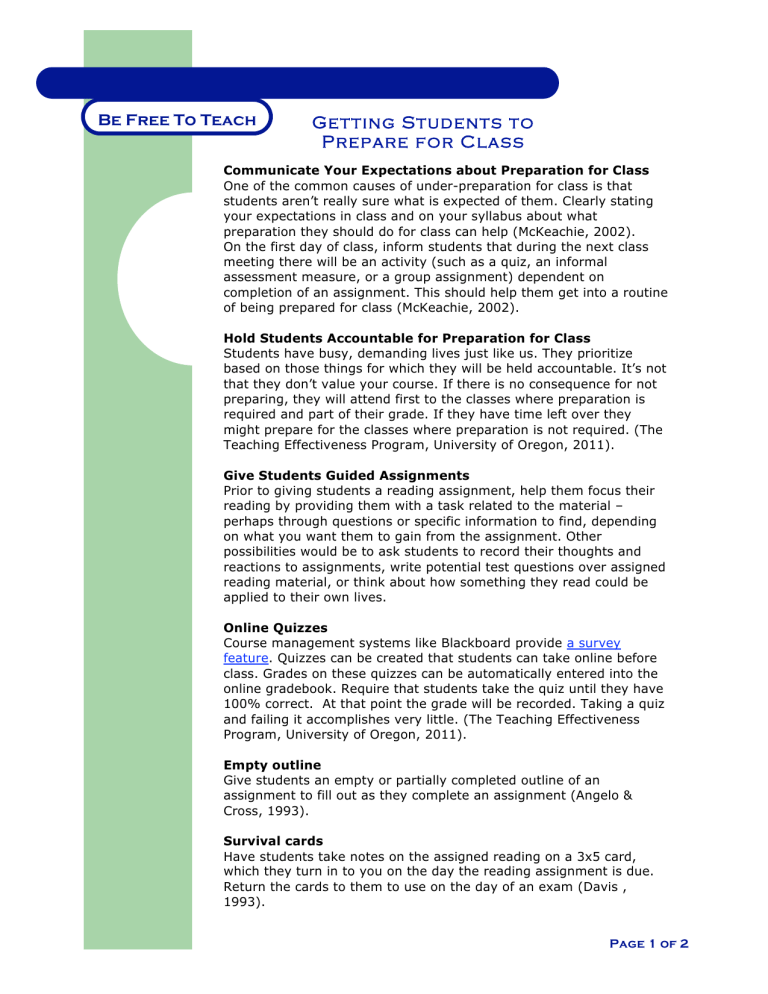
Be Free To Teach
Getting Students to
Prepare for Class
Communicate Your Expectations about Preparation for Class
One of the common causes of under-preparation for class is that students aren’t really sure what is expected of them. Clearly stating your expectations in class and on your syllabus about what preparation they should do for class can help (McKeachie, 2002).
On the first day of class, inform students that during the next class meeting there will be an activity (such as a quiz, an informal assessment measure, or a group assignment) dependent on completion of an assignment. This should help them get into a routine of being prepared for class (McKeachie, 2002).
Hold Students Accountable for Preparation for Class
Students have busy, demanding lives just like us. They prioritize based on those things for which they will be held accountable. It’s not that they don’t value your course. If there is no consequence for not preparing, they will attend first to the classes where preparation is required and part of their grade. If they have time left over they might prepare for the classes where preparation is not required. (The
Teaching Effectiveness Program, University of Oregon, 2011).
Give Students Guided Assignments
Prior to giving students a reading assignment, help them focus their reading by providing them with a task related to the material – perhaps through questions or specific information to find, depending on what you want them to gain from the assignment. Other possibilities would be to ask students to record their thoughts and reactions to assignments, write potential test questions over assigned reading material, or think about how something they read could be applied to their own lives.
Online Quizzes
Course management systems like Blackboard provide a survey feature . Quizzes can be created that students can take online before class. Grades on these quizzes can be automatically entered into the online gradebook. Require that students take the quiz until they have
100% correct. At that point the grade will be recorded. Taking a quiz and failing it accomplishes very little. (The Teaching Effectiveness
Program, University of Oregon, 2011).
Empty outline
Give students an empty or partially completed outline of an assignment to fill out as they complete an assignment (Angelo &
Cross, 1993).
Survival cards
Have students take notes on the assigned reading on a 3x5 card, which they turn in to you on the day the reading assignment is due.
Return the cards to them to use on the day of an exam (Davis ,
1993).
Page 1 of 2
Getting Students to Prepare for Class
Be Free To Teach
Page 2 of 2
Preparation log
Have students keep a log of how much time they spend preparing for class and how productively that time was spent (Angelo & Cross, 1993).
Make the Relevance of Assignments Obvious
If assignments are not related to what happens in class or if students are not aware that they are, they will quickly decide that preparation is not essential.
Make the connection explicitly deliberately stating how assignments are connected to what you do in class – refer to material that was in assignments during class or ask questions related to assignments.
Tell students why you think an assignment is important – what skills they will be learning, what knowledge they will gain, how it will help them later
(Brookfield , 1990).
Relate assignments to students’ interests and experiences . Stress the personal satisfaction students may get from assignments. Involve students in planning appropriate and interesting assignments (Brookfield , 1990).
Pique students’ interest about assignments by making comments such as,
“This article is one of my favorites, and I’ll be interested to see what you think about it” (Davis , 1993).
Assess Students’ Preparation for Class
At the beginning of class, give students a quiz, group assignment, or discussion question that is dependent on them having prepared for class.
Focused listing
Choose a particular concept or two from an assigned reading and have students list several ideas that are related to the concept (Angelo & Cross,
1993).
Memory matrix
Give students a matrix, a table with row and column headings filled in – and have them fill in the blank cells, based on the material they read for class
(Angelo & Cross, 1993).
Minute paper
Give student two or three minutes at the beginning of the class to answer two questions: “What is the most important thing you learned from the assignment?” and “What important questions remain unanswered?” (Angelo &
Cross, 1993).
References
Angelo, T. A. & Cross K. P. (1993). Classroom assessment techniques (2nd ed.). San Francisco : Jossey-Bass.
Brookfield , S. D. (1990). The skillful teacher . San Francisco : Jossey-Bass.
Davis, B. D. (1993). Tools for teaching . San Francisco : Jossey-Bass.
McKeachie, W. J. (2002). Teaching tips (11th ed.). Boston : Houghton-Mifflin.
Teaching Effectiveness Program
Teaching and Learning Center
Phone: (541) 346-3226
Email: tep@uoregon.edu
Website: http://tep.uoregon.edu


